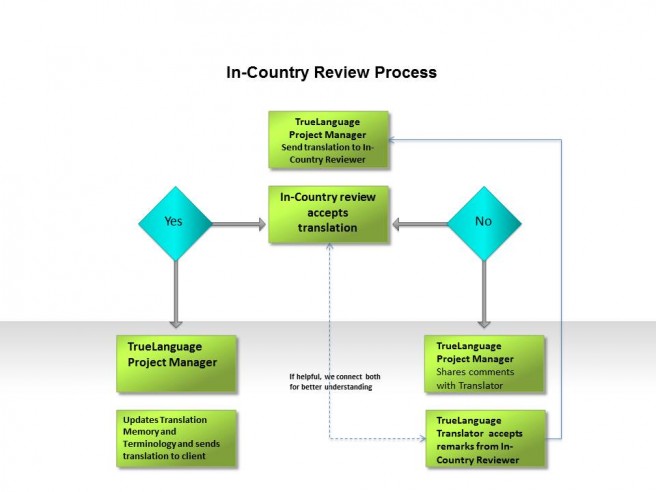This content has been archived. It may no longer be relevant
Through our blog articles, we strive to share localization knowledge with our readers and followers on Facebook and twitter and, of course, on our website. We do not hesitate to share “insider” information even though that means that we are not only educating our clients but also our competitors. In the end, we all win. As experts in localization, glocalization, globalization and internationalization, we are dedicated to making the process of “going global” easier for everyone. And one of our pivotal services for facilitating the international outreach of our clients is in-country review – an essential step in a quality translation process.
The in-country reviewer is the ultimate local expert who validates a translation with respect to terminology, branding, company lingo, etc., making him/her a very important player in the process.
Selecting an In-Country Reviewer
- Choose a reviewer who is a native speaker of the target language and lives in the target market
- Proficiency in the English language is essential so that the translated text can be compared accurately to the English version
- The ideal reviewer should be detail-oriented and proficient in grammar, punctuation, and spelling in the native language
Setting Expectations and Ground Rules
Once a reviewer has been chosen, provide clear instructions in order to achieve the desired result. Establish ground rules before the project launches. These include:
- Incorporate the review process into the project timeline. Make sure the amount of time the reviewer has to review the translation is included
- Give clear instructions regarding the goal of the client-review (e.g. consistency with company specific terminology)
- Establish how disagreements concerning translations will be handled (e.g. comments or mark-up in Revision Mode in MS Word)
In addition to laying the ground rules, it is important to establish expectations from the start. For example, a reviewer should resist the temptation to ‘improve’ the translation through editing or rewriting without first consulting the translator or project manager. Doing so could alter the meaning of the text. Similarly, different terminology should not be introduced based on personal preference unless it better reflects local company usage.
Recommended Instructions for an In-Country Reviewer
We recommend providing instructions to the in-country reviewer that you select. Below are some of the directions we suggest.
- Please read the translation for clear and accurate meaning and compare it to the English version; consult the glossary (if available)
- Do not add or delete information (the source text was approved by Legal, Corporate, Marketing, etc.)
- Do not make stylistic changes based on personal preference
- Please correct company or industry-specific terminology where appropriate (use “Track Changes” function)
- Please mark any errors in punctuation, spelling, or grammar
- Comments and suggestions should be made in a section/column for client review or clearly marked “Client Review” (Insert comment boxes or a comment column)
- Please provide a brief explanation for any changes
- Your suggestions will be reviewed by the translator
As a final step, we suggest that the edits made by the In-Country Reviewer are always sent back to your Language Service Provider (LSP). The LSP will review the changes, add important terminology changes to the glossary and translation database, and correct any mistakes made by the reviewer.
The last step and a best practice of the localization process is the update of the Translation Memory with the final and approved translation so it is available for version updates and similar source materials.
Feedback is Essential
If the In-Country Review is part of the localization process than feedback is important. Even if the translation is accepted immediately, your LSP should be advised. Likewise, if changes are made or suggested, your LSP will want to know that as well. Don’t just fix a translation without telling your LSP because the next time you have an update on a specific translation, it is possible your LSP will provide you with the incorrect translation. At TrueLanguage, we store your translation in a Translation Memory which enhances quality, consistency, and will reduce the translation volume/costs over time. But this can only happen if we know what the final approved translation is.
Time to Market = Time is Money
One last thought: usually an In-Country Reviewer doesn’t have the In-Country Review on his/her job description and may not give the review the urgency it requires. Therefore, it is essential for everybody to understand the importance of the review. Late or untimely feedback can lead to a late product launch, which can cost a company millions of dollars.
Consider a Partnership with TrueLanguage
Are you looking for a partnership with a language service provider? If so, you may wish to consider TrueLanguage. We offer ISO-certified state-of-the-art business translation services that are on budget, on time, and to the exact specification. Every time. Or perhaps you’re just looking for a cost-free, no-obligation estimate for your next translation project. Either way, we’d love to hear from you!


